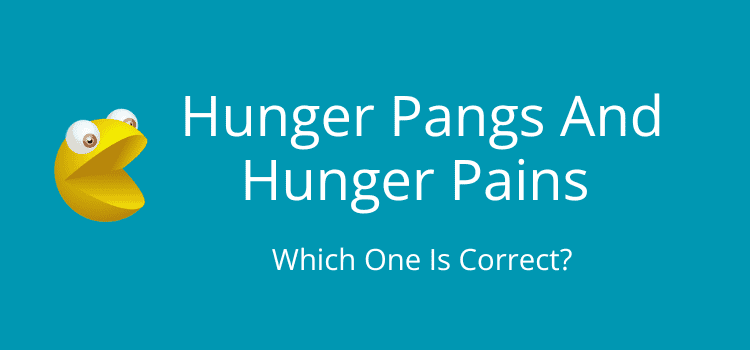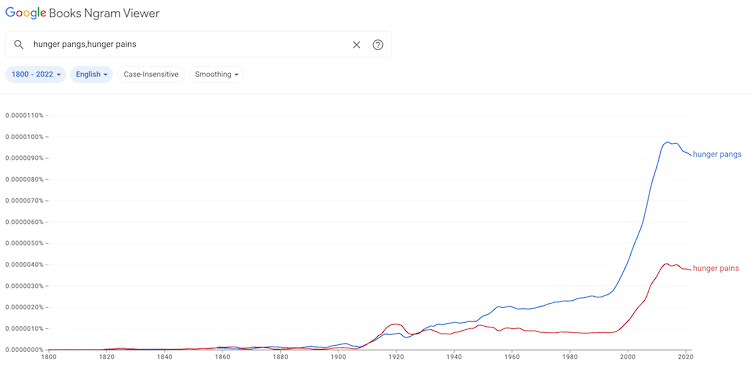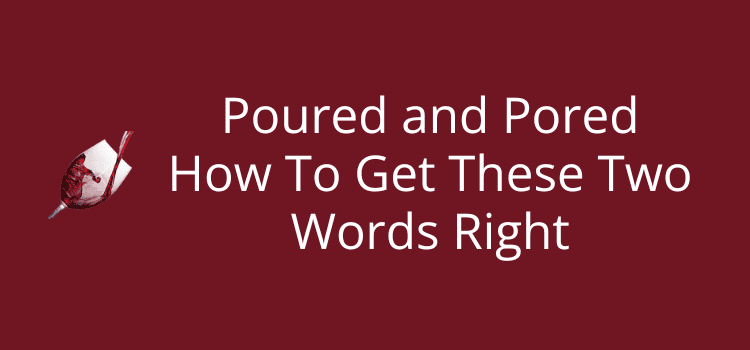
We’ve all experienced the discomforting sensation of an empty stomach. But are you suffering from hunger pains or hunger pangs?
For a writer, it’s yet another fixed expression where the similarity between two words can cause confusion.
Luckily, the two versions of this expression are generally accepted, but pangs is considered the most correct form.
However, as with all fixed expressions, it’s always better to know than to guess.
The origins of hunger pangs
The etymology of the word pang is uncertain.
However, some references indicate the word could have derived from the late 15th century words prong or pange.
According to the Oxford English Dictionary (OED), the earliest known use of the word pang was in the early 1900s.
OED’s earliest evidence for pang is from 1907, in the writing of E. M. Forster, novelist and essayist.
When I checked the usage, the graph below shows that the OED is probably correct.
You can see that the expression only came into use around 1900.

It’s interesting to note that using either pangs or pains in the fixed expression also occurred very early on.
Because the two words are quite similar in meaning of a sharp or sudden discomfort, it’s easy to understand why the two words were interchangeable.
However, you can see that around 1950, the expression hunger pangs became the most used form.
Why you should always use the correct form
It’s pretty clear that both pangs and pains are acceptable in the expression relating to hunger.
However, for any form of writing, it’s always better to be accurate and use the correct or most accepted form of any fixed expression.
For some expressions, you might find that as language use changes, two possibilities become acceptable over time.
Expressions like card sharp and card shark and slight or sleight of hand are examples of fixed expressions that now have two commonly accepted forms.
Again, though, you should aim to use the original and correct form.
But you should take extra care with commonly confused words in many expressions that are incorrect.
Examples include:
Bare your soul, and not bear your soul.
Piqued my interest, and not peaked my interest.
Hazard a guess, and not has at a guess.
On tenterhooks, and not on tender hooks.
In any form of writing, you will often use fixed expressions. However, thinking that you are correct can be a trap.
If it’s an expression that you rarely use, it always pays to check that you are using the original and correct form.
Don’t rely on your memory, or worse, the sound of the words.
Summary
Hunger pains and hunger pangs are so similar in meaning and sound that it’s easy to understand why both forms are now generally acceptable.
However, your writing will be much better if you use the original form.
There’s always a chance that a fussy reader will notice if you use pains instead of pangs.
I’ve had many comments over the years from readers who like to pick up on any minor grammar or vocabulary point.
And I always see that as a good thing because it means people are reading my writing.
Sometimes, they can be a bit picky, but very often, they might highlight a minor but genuine mistake in my writing.
However, it’s best to avoid this happening if you can by being attentive to your writing, and in this case, with often confused fixed expressions.
Related Reading: Mute Point Or Moot Point And Why Your Decision Is Mooted
Share This Article


